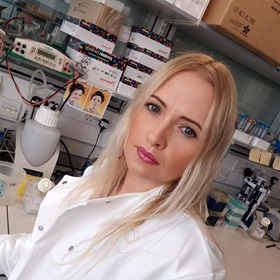The Institute of Cancer Research, London, strongly welcomes the decision by NICE to recommend that the targeted drug olaparib can be used for locally advanced or metastatic breast cancer.
The judgement makes this pioneering treatment available on the NHS for people with HER2-negative breast cancer, caused by faulty BRCA1 or BRCA2 genes, which has advanced or spread following chemotherapy. The treatment offers the chance of longer, healthier lives for thousands of patients.
More patients can now benefit from olaparib
Olaparib is a precision medicine that belongs to a class of drugs called PARP inhibitors. It targets the specific biology of cancers linked to faulty BRCA1 or BRCA2 genes and works across many different cancer types.
Olaparib has been available on the NHS in England and Wales for women with early-stage, high-risk breast cancer with inherited mutations in BRCA1 or BRCA2 since April 2023. Today’s news means that olaparib’s benefits can reach NHS patients with advanced breast cancer, whose disease has returned after previous treatment.
The ICR's role in the development of olaparib
The Institute of Cancer Research (ICR) has played a crucial role in the development of olaparib. ICR scientists were the first to demonstrate that cancer cells with mutations in BRCA1 or BRCA2 were highly susceptible to PARP inhibitors like olaparib.
Clinical trials of olaparib, led by researchers from the ICR and The Royal Marsden NHS Foundation Trust, then showed that olaparib was effective for patients with a range of cancers associated with BRCA1 or BRCA2 mutations.
Professor Andrew Tutt was part of the ICR team at the Breast Cancer Now Toby Robins Research Centre that carried our early laboratory work which revealed how PARP inhibitors could target cancers with mutations in BRCA1 and BRCA2. He was the lead Principal Investigator of the phase III OlympiA trial, which revealed the benefits of olaparib in improving the chances of surviving high risk early-stage breast cancer, which led to the decision by NICE in 2023 to recommend olaparib for these patients.
'Another important therapy option for our patients'
Professor Andrew Tutt, Director of the Breast Cancer Now Toby Robins Research Centre at The Institute of Cancer Research, London and King’s College London, said:
“Locally advanced or metastatic HER2-negative breast cancer remains a devastating diagnosis. For those with this form of breast cancer and with inherited BRCA-mutations, the OlympiAD phase III trial demonstrated how olaparib – a PARP inhibitor that targets the mutated BRCA genes in cancer cells – can significantly delay cancer progression or death compared to standard chemotherapies.
“These results underpinned this positive NICE recommendation, which now provides another important oral targeted therapy option for our patients with this challenging diagnosis. This emphasises the importance of accessing genetic testing, so that these targeted drugs can reach the patients who will benefit from them.”
Professor Kristian Helin, Chief Executive of The Institute of Cancer Research, London said:
“Olaparib was the first cancer drug in the world to target an inherited genetic fault, and I am pleased that today’s announcement means that more patients will be able to access it on the NHS. Following the earlier recommendation for olaparib to treat early breast cancer, patients with advanced or metastatic breast cancer who are in desperate need of better treatment options will now be able to receive the targeted therapy.
“I’m proud of the decades of research at the ICR that have underpinned this achievement. Our scientists worked to understand and target the underlying cause of these inherited cancers – involving partnerships between academia, industry and charities across the world to deliver clinical trials – which has led us to a cutting-edge treatment which exploits the very mutation that caused the cancer.”
Olaparib is a game-changing treatment for many people with cancers linked to inherited BRCA1 and BRCA2 genes.
Find out how olaparib is transforming patients' lives.
 .
.